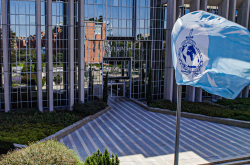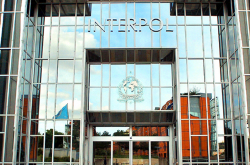This week in Vienna, at the annual global meeting of police leaders from around the world, whether in huddled groups in quiet corridors or on the main stage, every law enforcement officer will be talking about one thing: The explosive growth of transnational organized crime.
What every police force knows, but the rest of the world has yet to realize, is that there has been an epidemic of transnational organized crime and at such a scale that it is now a global security crisis.
Whether you are worried about gang fights on your streets, the sexual exploitation of children, forced labour or a drug epidemic killing people in your community, what you are really worrying about is transnational organized crime.
And make no mistake – these are not just concerns in your community and in your country – this is happening globally.
The COVID pandemic accelerated enormous societal changes – and nowhere is that more true than transnational organized crime.
Criminal groups around the world are using the dark web and other tools to create a whole new business model – gone are the days of codes of silence amongst tight-knit groups; these criminal groups do not even know who they are working with and are making anonymous connections online.
They are outsourcing, creating partnerships, bringing together different criminal activities. They are expanding markets globally while operating under the radar and often undetected, simultaneously undermining the rule of law and democracy in those countries.
This is all cyber enabled, but we are also seeing the growth of online crime committed in one country and exploiting people in another – cybercrime as a service for the price of a takeaway meal. Vulnerable people being targeted every second of the day for their life savings in romance scams, fraud and password hacks.
What is a local police officer meant to do about a criminal who is 7,000 miles away? In fact, what is the most well-resourced police service meant to do about a criminal operating anonymously on a different continent? No single law enforcement body, no regional grouping, no one can tackle this explosion of organized crime on their own.
International organized crime groups are exploiting difficult relationships between countries, they are exploiting conflicts and they are exploiting the fact that law enforcement’s investment in technology has been significantly outpaced by the criminals.
In a splintered world, a message of greater global unity is challenging – but without greater information sharing, more cooperation, and without giving every police officer in every community the tools to recognize and tackle transnational organized crime, no country in the world can cope with this challenge on their own.
That is why, later today at INTERPOL’s annual conference in our centenary year, we will be launching the Vienna Declaration.
This will make clear to the world’s leaders – on behalf of their police officers – that without treating this explosion, this second pandemic, this crisis of transnational organized crime as a shared, global national security crisis, none of our communities will be safe.
This epidemic can only be tackled by urgent, coordinated global action, greater cooperation between countries and regions and by investing in shared technology. The perilous state of global security means that bringing the world together is now urgent.
The world faces many challenges – climate change, geopolitical tensions and regional conflicts and it will be tempting for leaders to hope someone else will find a solution, but that is not going to happen. We can only tackle this explosion of transnational organized crime if we all do our part.
The first duty of a state is to keep its people safe. Without unity in addressing this threat, and addressing it now, it is going to be beyond the reach of the world’s law enforcement and security agencies.





